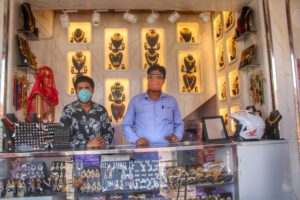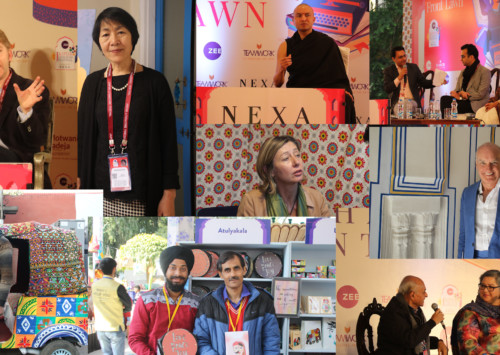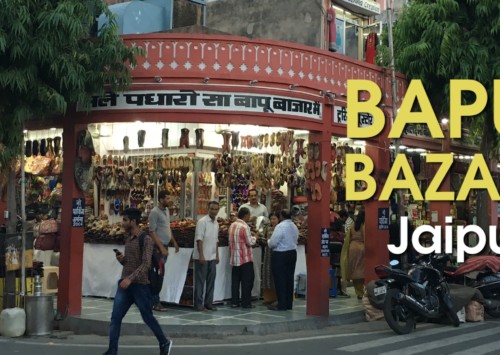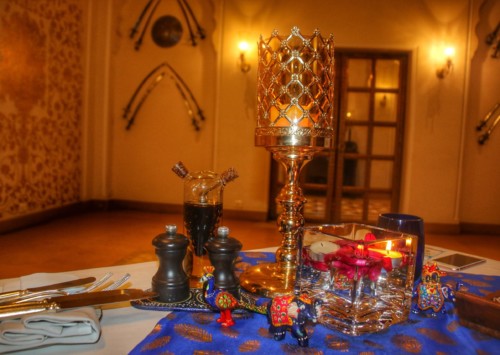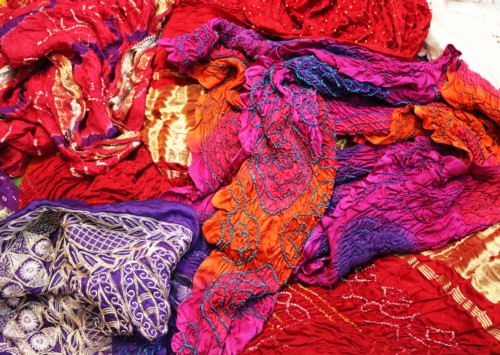Tourists, local shoppers desert Jaipur
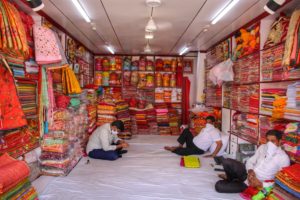
Turbans, the hallmark of traditional Rajasthani attire, have no heads to adorn (MIG photos/Varsha Singh)
A popular destination for tourists, Indian and foreign alike, Jaipur’s numerous markets have been catering to both the segments of buyers. But even almost a month after markets reopened, most shops remain empty as buyers stay away.
After Agra, it is perhaps the Indian city that is the most visited by tourists, both foreign and domestic alike. The Rajasthani capital, Jaipur, also known as the Pink City, is a huge draw not just for its forts and palaces or its delicious cuisine, the Rajasthani handicrafts and textiles are equally popular due to their high quality and reasonable prices.
That is the main reason that most of the stand-alone shops in the city, especially near tourist landmarks like the Hawa Mahal (Palace of Wind), the shops are crowded with as many locals as foreigners, eager to snap up a bargain buy or haggling hard with the shopkeeper for a discount, however minimal, even for an item costing INR 100. By having entirely different segment of buyers, most shopkeepers stay busy with customers for a large part of the year as though the peak season for tourists start only in October and is over by late March, the domestic season peaks twice – in late March-early April and then again in September.
However, the year 2020 has been disastrous for the shopkeepers. With the coronavirus outbreak reaching Europe in January, most foreign tourists called off their visit and after the ban on all international flights, even the handful of the courageous ones who may have wanted to travel despite the pandemic found themselves with no other choice than sit at home. Similarly, the imposition of the lockdown in late March and the subsequent extensions and the resultant collapse of the Indian economy has delivered a near fatal blow to the shopkeepers, who complain that this has been the worst year ever for them, including over 100 years for some of them.
“There is practically no business now. Earlier our per day sale was around INR 50,000-60,000, but now on a good day it barely reaches INR 5,000-10,000. The business has gone down drastically and we don’t see any recovery till March or April next year. I had two workers who had gone home but now have come back,” says Ambrish Agarwal, who runs Prabhu Narayan Giriraj Kumar, a garments shop specialising in wedding dresses, just a stone’s throw away from the Hawa Mahal.
Agarwal says that even though he reopened the shop on June 1, as soon as the government allowed Jaipur markets to reopen, the footfall has been extremely low even from locals of Jaipur and residents of other parts of the state due to the extreme difficulties in movement as not only has the public transport remained shut since March 25, but even the people with their own vehicles find too many hurdles in moving about, due to large police presence, numerous checkpoints as well as the constantly changing norms as both the union and state governments in India struggle to come up with a coherent response to the coronavirus pandemic.
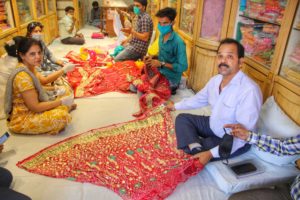
The few weddings that may take place this year would be dramatically scaled down, hitting wedding dress sellers hard
Agarwal goes on to say that people are also reluctant to come for shopping unless it is absolutely essential for the fear of the virus and also as they are worried about the situation of the Indian economy and find themselves increasingly insecure about their financial well-being.
A couple of shops away from Agarwal’s shop is Ganpat Lal Maliram, specialising in selling Rajasthani turbans and other traditional dresses. On the day your correspondent visited the shop, it was bereft of any customers, even as the owners of the shop kept looking at the street outside, hoping that a customer stepped in. Nand K Agarwal says that the lockdown hit his business particularly hard due to its sheer bad timing. “We sell to the locals and tourists alike and our peak season of the year is the Navratras, a 9-day festival that occurs twice a year, in March-April and September-October when believers observe a fast during the day. This year, the Navratras had just begun when the government announced the lockdown and we lost a huge chunk of our annual earning,’’ says Agarwal.
He goes on to say that even after the lockdown had been eased, his business has remained practically dead. “Earlier, we would receive about 60 customers a day. Now, we received just one yesterday and 4 or five the day before. I don’t see any improvement in the situation up to Diwali as people will be scared to move about and only those who have an urgent family event would perhaps come to shop,’’ he adds.
Indeed, that was the case with Nisha Tak, a housewife from Bikaner, a city in Rajasthan, about 350km northwest of Jaipur. Tak was sitting in the Prabhu Narayan Giriraj Kumar shop with her family members who had all driven the distance as there was an urgent wedding in the family coming up. “Basically, we have some very elderly people in the family and it was their desire to see the wedding take place at the earliest so they could participate in it. That’s the only reason why we are going ahead with the wedding,’’ says Tak, whose younger brother-in-law is the groom-to-be.
Tak goes on to add that the wedding would be dramatically scaled down, partly due to the government restrictions but also due to the sheer difficulties in travelling and organising lavish weddings during the pandemic. Hence, the guest list is being scaled down from nearly 2,500 to less than 100, she says.
Ambrish Agarwal goes on to add that if even very well-to-do families like Tak’s go easy on expenditure during the pandemic, he sees no chance of a revival in the market and buying before the end of March next year as the economy would take that long to come back into some shape.
The shopkeepers say that while they have continued to pay salaries to their employees so far, they are not certain how long they can continue to pay if the market remains as dead as currently. Most of the shopkeepers here are praying for a miracle to turn the sentiments and for tourists to start thronging the lanes of Jaipur exactly as they traditionally do, practically round the year.
Rajvesh is another famous garments shop in the same area. Just last year, they diversified into imitation jewellery, another very popular and fast moving product, appealing to the tourists as much as to the locals. However, Anil Khunteta, the owner, says it has proven to be a dead investment as buyers are just not there, even for a trinket costing barely INR 100. “Right now, most people are simply not sure what the future holds for them and whether their jobs are secure or not. Amidst this insecurity, they prefer to cut out any expense that they consider to be inessential or wasteful. Imitation jewellery is certainly not something that people need, so I see little hope in the near future for us,’’ he concludes.

